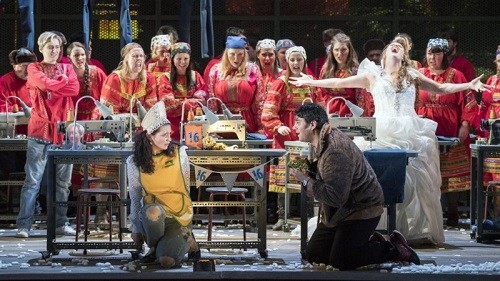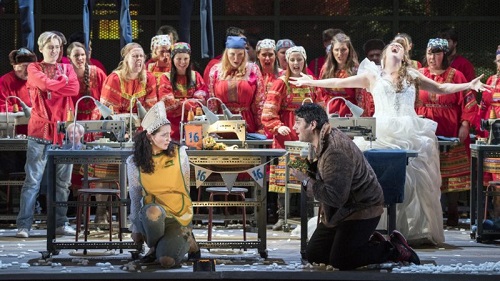 United Kingdom Rimsky-Korsakov, The Snow Maiden: Soloists and Chorus of Opera North/Leo McFall, Grand Theatre, Leeds, 21.1.2017. (JL)
United Kingdom Rimsky-Korsakov, The Snow Maiden: Soloists and Chorus of Opera North/Leo McFall, Grand Theatre, Leeds, 21.1.2017. (JL)

Cast:
The Snow Maiden – Aoife Miskelly
Tsar Berendey – Bonaventura Bottone
Bermyata – Dean Robinson
Spring Beauty – Yvonne Howard
Grandfather Frost – James Creswell
Boblyl Bakula – Joseph Shovelton
Boblyikha – Claire Pascoe
Lel – Heather Lowe
Kupava – Elin Pritchard
Mizgir – Phillip Rhodes
Production:
Director – John Fulljames
Set Designer – Giles Cadle
Costume Designer – Christina Cunningham
Lighting Designer – Matthew Haskins
Video Designer – Will Duke
Choreographer – Lucy Hind
The Snow Maiden is one of those operas that is staple repertoire its own country and little performed elsewhere. Opera North boldly launched the fairy tale themed second half of its season with the first full British production for decades.
The characters and the Winter background are both at the heart of Russian culture. The Snow Maiden (Snegurochka) is a popular national figure and little girls dress up as her as part of New Year celebrations. Her father, Grandfather Frost is a sort of Father Christmas figure and her Mother represents Spring. Winter, and above all the yearning for the warmth of Spring are central, national preoccupations.
The story represents that brand of fairy tale that is inhabited by two kinds of being, separate but parallel in the same world: humans and semi supernatural characters who are not destined to mix. If one of the latter falls in love with a human and is determined to join the other side it can only be done at enormous cost and will inevitably lead to trouble and tragedy. In operatic terms the best known example of the theme is Dvořák’s Rusalka.
The point of fairy tales is to be transported to a place where only the imagination can go. To tell them theatrically on stage with real people within the confines of a proscenium arch is never going to be easy. Thus the cartoon has major advantages and a beautiful full length animated film of the Snow Maiden story was made in the Soviet Union in 1952 with music taken from the opera an integral part.
In order to transport us, Opera North has pulled out all the stops, emphasising the difference between the two worlds, the Snow Maiden’s frozen forest and the bustling life of the nearby village. Russian costumes are a major feature, so much so that the curtain rises on a clothing factory with rows of women working at sewing machines. The following scene in the frozen forest has the Snow Maiden emerge wearing on her head a traditional bejewelled headdress, her torso neutrally attired and below a pair of distressed jeans. Presumably this is to represent someone psychologically trapped between two worlds. The scene brings with it a major feature of the production – a nod to the filmed cartoon – animated graphic images projected at both the back and onto a frontal gauze curtain. Patterned snowflakes abound and whirl, and later beautiful floral images flutter. Throughout there are lively episodes of village members rollicking about in complicated choreography, contrasting effectively with the moments of peace and repose.
There was distinguished singing from a cast that ranged from exciting up and coming talent to seasoned professionals of high reputation. Irish soprano Aoife Miskelly invested the Snow Maiden with suitable demureness in the role of a stereotypical, vulnerable damsel tortured with longings for the unobtainable. In her case the Spring-warmth of a love that can melt an icy heart is a dangerous thing. Miskelly has a pleasingly light, agile voice that suited the role well but Rimsky-Korsakov gave her little chance to spread her vocal wings in what is, or should be, the lead act. Her rival in love, the go-getting good-time-girl who becomes a frighteningly vengeful woman scorned has a far better crack of the whip. Elin Pritchard carried all before her with splendid comic timing and general aplomb with a powerful voice to match. The scope of the role allowed her to get close to stealing the show.
Mean old Grandfather Frost was sung by superb bass James Creswell who was another whose role gave him little chance for us to savour what he can offer. However, the tenor part of the Tsar, the ruler who bestows justice with magnanimity, has some of the most glorious melodic lines, rendered here by a man who I was seeing in major roles in London forty years ago shortly before he was to set out strutting the stages of some of the world’s leading opera houses. Bonaventura Bottone gave us a firm indication that he’s not quite finished yet. Lel is a young village man over whom all the girls faun and swoon. Rimsky writes it as a trouser role and I do think Heather Lowe’s performance was one of the most effective operatic portrayals of a male by a woman that I’ve even seen. She managed to avoid that artificial strutting about and hands on hips that never really convinces.
Come the end of the opera Snow Maiden is dressed for her betrothal in a blazingly white wedding dress and gets, at last, to sing a substantial duet and a beautiful solo aria. The scene, with its following denouement, is one of the most notable in the opera. Yet by the end I felt that the whole show had never developed the dramatic power that the story has the potential to offer. That is not Opera North’s fault. This is a flawed opera with erratic pacing, narrative jolts, misjudged juxtaposition of serious and comic and under developed characterisation. Was musicologist Gerald Abraham, a biographer of Rimsky-Korsakov, overly cruel when he judged that the composer, ‘suffered from what might seem a crippling disability: lack of dramatic power, in particular the capacity to create characters in sound’? Nevertheless there is much to enjoy in the music from a composer who was an acknowledged master of the orchestra. Leo McFall did sterling duty in the pit, stirring up the folk dance rhythms when necessary yet keeping his forces under control when needed to support the singers, so much so that, hearing them singing in English I found it mostly unnecessary to refer to the surtitles provided.
An enormous amount of effort has gone into mounting this production. Was it worth it? Well there is only one way to find out: go and see it if you can. Full marks to Opera North and John Fulljames and his team for giving it their best shot, and a good shot it is too. There were times when I thought the pile up of effects and stage business might be distracting and too much for their own good but I could not help wondering that if they were pared down, would it further expose the opera’s weaknesses.
If you are able to see it, there are opportunities after Leeds to catch up with performances at Newcastle, Salford, Belfast and Nottingham. If you do not know the story’s dénouement, I recommend not reading the synopsis. At least you can then savour the frisson of wondering how it will all end.
John Leeman
